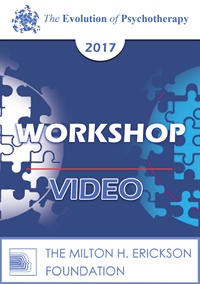
Credit available - Click Here for more information
- Average Rating:
- Not yet rated
- Topic Areas:
- Workshops | Post-Traumatic Stress Disorder (PTSD) | Trauma | Future Oriented | Psychotherapy | Brief Therapy
- Bundle:
- EP17 Video Stream Build a Bundle | Learning Track - EP17 Trauma Stream
- Categories:
- Evolution of Psychotherapy | Evolution of Psychotherapy 2017 | Evolution of Psychotherapy Trauma Learning Track | Online Continuing Education
- Faculty:
- Bill O'Hanlon, MS
- Course Levels:
- Master Degree or Higher in Health-Related Field
- Duration:
- 2:35:20
- Format:
- Audio and Video
- Original Program Date:
- Dec 13, 2017
- Short Description:
- This workshop will detail a philosophy and methods of working briefly and effectively with people who have been traumatized. An array of new methods has shown that previous conceptions and methods of working with trauma are unnecessarily long-term and re-traumatizing. These new approaches, rather than being based on the past and deterministic models, are oriented towards the present and future and a sense of possibilities.
- Price:
-
Sale is $29.00
price reduced from Base Price - $59.00
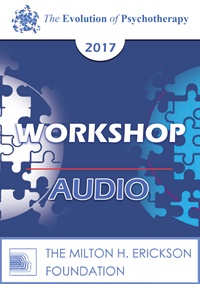
- Average Rating:
- Not yet rated
- Topic Areas:
- Workshops | Couples Therapy | IMAGO | Psychotherapy | Relationships
- Bundle:
- EP17 Audio Streaming Build a Bundle
- Categories:
- Evolution of Psychotherapy | Evolution of Psychotherapy 2017
- Faculty:
- Harville Hendrix, PhD | Helen LaKelly Hunt, PhD
- Duration:
- 2:44:25
- Format:
- Audio Only
- Original Program Date:
- Dec 13, 2017
- Short Description:
- The benefits of therapy tend to be confined to the clinic and to targeted clients with specific complaints. This workshop describes the process and outcome of distributing--face to face and through social media--the core therapeutic processes to the general public. Participants will experience the structure and process of a Safe Conversation, a relational psychoeducational process, the strategies and tactics of cultural healing and invited to join in developing a relational culture.
- Price:
- $15.00 - Base Price
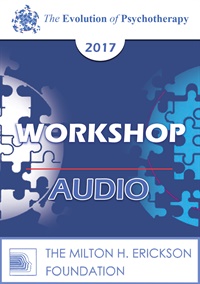
- Average Rating:
- Not yet rated
- Topic Areas:
- Workshops | Neuro-Linguistic Programming (NLP) | Communication | Psychotherapy
- Bundle:
- EP17 Audio Streaming Build a Bundle
- Categories:
- Evolution of Psychotherapy | Evolution of Psychotherapy 2017
- Faculty:
- Robert Dilts, BA
- Duration:
- 2:46:41
- Format:
- Audio Only
- Original Program Date:
- Dec 13, 2017
- Short Description:
- For too long, and in many ways unintentionally, we’ve tried to organize our world from disjointed mental constructs. This fragmented perspective of the world has led to more and more personal imbalance, social violence and increasing environmental degradation. In this workshop, we will examine how to engage heartfull, embodied intelligence to transform disconnected, fear-based and limited thinking and behaviors into nourishing and respectful life choices. You will explore processes that enrich your capacity to coach others into greater states of wholeness and presence through the body, the voice, movement and receptive listening.
- Price:
- $15.00 - Base Price
Tags: Psychotherapy Communication NLP
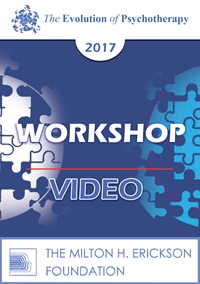
Credit available - Click Here for more information
- Average Rating:
- Not yet rated
- Topic Areas:
- Workshops | Post-Traumatic Stress Disorder (PTSD) | Couples Therapy | Gottman Method | Psychotherapy | Trauma
- Bundle:
- EP17 Video Stream Build a Bundle
- Categories:
- Evolution of Psychotherapy | Evolution of Psychotherapy 2017 | Online Continuing Education
- Faculty:
- John Gottman, PhD | Julie Gottman, PhD
- Course Levels:
- Master Degree or Higher in Health-Related Field
- Duration:
- 2:23:26
- Format:
- Audio and Video
- Original Program Date:
- Dec 13, 2017
- Short Description:
- Couples therapy is made much more complex when one or both partners suffers from PTSD. This workshop will demonstrate with films and lecture how to apply Gottman Method Couple Therapy to the treatment of PTSD. Films include cases of both childhood and military trauma.
- Price:
-
Sale is $29.00
price reduced from Base Price - $59.00
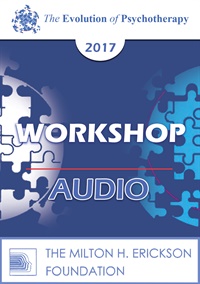
- Average Rating:
- Not yet rated
- Topic Areas:
- Workshops | Consciousness | Binds | Art and Creativity | Ericksonian Hypnosis and Therapy Techniques | Psychotherapy
- Bundle:
- EP17 Audio Streaming Build a Bundle | Learning Track - EP17 Erickson Download
- Categories:
- Evolution of Psychotherapy | Evolution of Psychotherapy 2017 | Evolution of Psychotherapy Erickson Learning Track
- Faculty:
- Ernest Rossi, PhD | Kathryn Rossi, PhD
- Duration:
- 2:38:21
- Format:
- Audio Only
- Original Program Date:
- Dec 13, 2017
- Short Description:
- MHE's 1965 paper "A Special Inquiry with Aldous Huxley into the Nature and Character of Various States of Consciousness" will be used so everyone can experience their personal version of Deep Reflection, the Double Dissociation Double Bind and the Quantum Qualia of their private consciousness and cognition for facilitating gene expression and brain plasticity to optimize their own growing edges.
- Price:
- $15.00 - Base Price
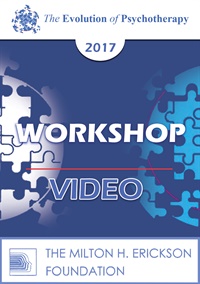
Credit available - Click Here for more information
- Average Rating:
- Not yet rated
- Topic Areas:
- Workshops | Post-Traumatic Stress Disorder (PTSD) | Trauma | Mind-Body | Psychotherapy
- Bundle:
- EP17 Video Stream Build a Bundle | Learning Track - EP17 Trauma Stream | Learning Track - Turn Down the Trauma
- Categories:
- Evolution of Psychotherapy | Evolution of Psychotherapy 2017 | Evolution of Psychotherapy Trauma Learning Track | Online Continuing Education
- Faculty:
- Peter Levine, PhD
- Course Levels:
- Master Degree or Higher in Health-Related Field
- Duration:
- 1:38:05
- Format:
- Audio and Video
- Original Program Date:
- Dec 13, 2017
- Short Description:
- EP17 Workshop 10 - In an Unspoken Voice: How the Body Released Trauma and Restores Goodness - Peter Levine, PhD Traditionally, therapies have attempted to change perceptions of the world by means of reason and insight, with conditioning and behavior modification, or with drugs and medications. The trauma response is a set of defensive bodily reactions that people initially mobilize in order to protect themselves, both from threat, and then later, against feeling the crushing totality of their horror, helplessness and pain. However, as time goes on, this avoidance keeps them frozen and stuck in the past, unable to be fully present, in the here and now, and unable to go forward in life. Fixed in the defensive trauma response, the shame, defeat and humiliation, associated with the original event replays itself over and over again in the body. Dr. Levine explores the implications of Body-oriented psychotherapy and recent findings in the neurosciences, on how the brain and body deals with e
- Price:
- $0.00 - $29.00
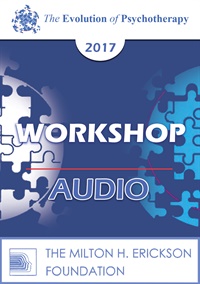
- Average Rating:
- Not yet rated
- Topic Areas:
- Workshops | Hypnosis | Psychotherapy
- Bundle:
- EP17 Audio Streaming Build a Bundle | Learning Track - EP17 Erickson Download
- Categories:
- Evolution of Psychotherapy | Evolution of Psychotherapy 2017 | Evolution of Psychotherapy Erickson Learning Track
- Faculty:
- Michael Yapko, PhD
- Duration:
- 2:21:55
- Format:
- Audio Only
- Original Program Date:
- Dec 13, 2017
- Short Description:
- Therapy has typically focused on explaining why people have their problems and why they sometimes make the poor choices they make. This workshop focuses on HOW, not why, people unintentionally make choices that negatively impact their emotional well-being and quality of life. We will identify obstacles to making the key discriminations that can give rise to better decision making, especially global cognitive style and a past orientation. We will explore the role hypnosis can play in encouraging the development of effective discrimination strategies that can lead clients to choose “this,” not “that.”
- Price:
- $15.00 - Base Price
Tags: Hypnosis Psychotherapy
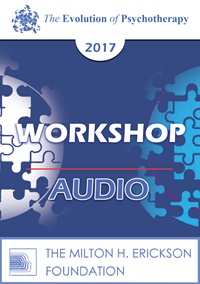
- Average Rating:
- Not yet rated
- Topic Areas:
- Workshops | Psychotherapy | Positive Psychology | Psychology
- Bundle:
- EP17 Audio Streaming Build a Bundle | Learning Track - EP17 Erickson Download
- Categories:
- Evolution of Psychotherapy | Evolution of Psychotherapy 2017 | Evolution of Psychotherapy Erickson Learning Track
- Faculty:
- Stephen Gilligan, PhD
- Course Levels:
- Master Degree or Higher in Health-Related Field
- Duration:
- 2:01:32
- Format:
- Audio Only
- Original Program Date:
- Dec 13, 2017
- Short Description:
- A central currency in the therapeutic exchange is negative experiences--depression, anxiety, trauma, addiction, etc. This practical and positive approach assumes that each core human experience has equivalent potential to be positive or negative, depending on the human relationship to it; and thus focuses on how problems may be transformed to resources by skillful human connection. This process operates at two levels: (1) developing a generative state (in the therapist, client, and relationship field) and then (2) using specific methods of transforming negative experiences and behaviors. Multiple techniques and examples for will be given, along with an exercise and demonstration.
- Price:
- $15.00 - Base Price
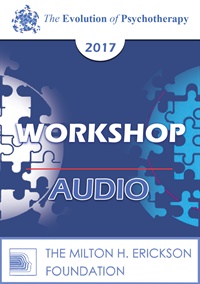
- Average Rating:
- Not yet rated
- Topic Areas:
- Workshops | Multicultural | Psychotherapy | Storytelling
- Bundle:
- EP17 Audio Streaming Build a Bundle
- Categories:
- Evolution of Psychotherapy | Evolution of Psychotherapy 2017
- Faculty:
- Jean Houston, PhD
- Duration:
- 2:51:28
- Format:
- Audio Only
- Original Program Date:
- Dec 13, 2017
- Short Description:
- Mythic structures illumine and fortify personal and cultural change. In using the significant myths that inform cultures and persons, there are potent means developed by Dr. Houston of applying mythic and symbolic material towards the shifting needs and challenges of our time. Houston will explore and demonstrate some of these.
- Price:
- $15.00 - Base Price
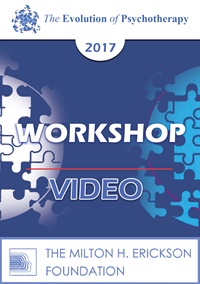
Credit available - Click Here for more information
- Average Rating:
- Not yet rated
- Topic Areas:
- Workshops | Attention Deficit Disorder (ADD) | Neuroscience | Psychotherapy
- Bundle:
- EP17 Video Stream Build a Bundle
- Categories:
- Evolution of Psychotherapy | Evolution of Psychotherapy 2017 | Online Continuing Education
- Faculty:
- Daniel Amen, MD
- Course Levels:
- Master Degree or Higher in Health-Related Field
- Duration:
- 2:59:22
- Format:
- Audio and Video
- Original Program Date:
- Dec 13, 2017
- Short Description:
- Based on the brain scans and clinical histories of over 20,000 patients with ADHD, this workshop will help clinicians properly diagnose ADHD and subtype it into 7 different types. They will also learn the clinical symptoms, brain imaging patterns and treatments for each type.
- Price:
-
Sale is $29.00
price reduced from Base Price - $59.00
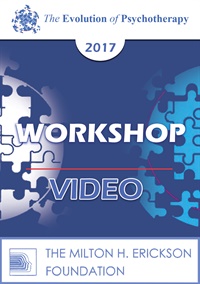
Credit available - Click Here for more information
- Average Rating:
- Not yet rated
- Topic Areas:
- Workshops | Post-Traumatic Stress Disorder (PTSD) | Trauma | Storytelling | Constructive Narrative | Addiction | Abuse | Borderline | Psychotherapy
- Bundle:
- EP17 Video Stream Build a Bundle | Learning Track - EP17 Trauma Stream
- Categories:
- Evolution of Psychotherapy | Evolution of Psychotherapy 2017 | Evolution of Psychotherapy Trauma Learning Track | Online Continuing Education
- Faculty:
- Donald Meichenbaum, PhD
- Course Levels:
- Master Degree or Higher in Health-Related Field
- Duration:
- 2:48:12
- Format:
- Audio and Video
- Original Program Date:
- Dec 13, 2017
- Short Description:
- Ways to implement the core tasks of psychotherapy with patients who evidence PTSD and co-morbid disorders of prolong and complicated grief, Substance Abuse Disorders and Borderline Personality Disorders. A case conceptualization model of risk and protective factors and incorporates a constructive narrator perspective will be presented.
- Price:
-
Sale is $29.00
price reduced from Base Price - $59.00
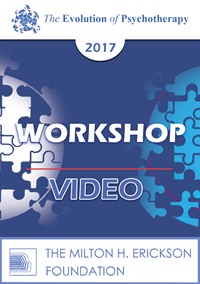
Credit available - Click Here for more information
- Average Rating:
- Not yet rated
- Topic Areas:
- Workshops | Couples Therapy | Family Therapy | Psychotherapy
- Bundle:
- EP17 Video Stream Build a Bundle | Learning Track - Couples Starter Kit
- Categories:
- Evolution of Psychotherapy | Evolution of Psychotherapy 2017 | Online Continuing Education
- Faculty:
- John Gottman, PhD | Julie Gottman, PhD | Bill Bumberry, PhD
- Course Levels:
- Master Degree or Higher in Health-Related Field
- Duration:
- 2:36:31
- Format:
- Audio and Video
- Original Program Date:
- Dec 14, 2017
- Short Description:
- It’s been 50 years since the revolutionary inception of General Systems Theory that started couples and family therapy. Yet the central concepts were never made precise, or measurable and the theory never became scientific. In this workshop we show how we can now complete this theory and produce effective and powerful couples and family therapy methods.
- Price:
-
Sale is $29.00
price reduced from Base Price - $59.00
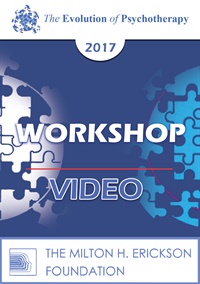
Credit available - Click Here for more information
- Average Rating:
- Not yet rated
- Topic Areas:
- Workshops | Post-Traumatic Stress Disorder (PTSD) | Trauma | Psychotherapy
- Bundle:
- EP17 Video Stream Build a Bundle | Learning Track - EP17 Trauma Stream
- Categories:
- Evolution of Psychotherapy | Evolution of Psychotherapy 2017 | Evolution of Psychotherapy Trauma Learning Track | Online Continuing Education
- Faculty:
- Bessel van der Kolk, MD
- Course Levels:
- Master Degree or Higher in Health-Related Field
- Duration:
- 2:17:19
- Format:
- Audio and Video
- Original Program Date:
- Dec 14, 2017
- Short Description:
- Trauma is a fact of life. Veterans and their families deal with the painful aftermath of combat; one in five Americans has been molested; one in four grew up with alcoholics; one in three couples have engaged in physical violence. Dr. Bessel van der Kolk, one of the world’s foremost experts on trauma, has spent over three decades working with survivors. He explores innovative treatments—from neurofeedback and meditation to sports, drama, and yoga—that offer new paths to recovery by activating the brain’s natural neuroplasticity.
- Price:
-
Sale is $29.00
price reduced from Base Price - $59.00
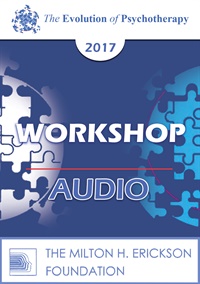
- Average Rating:
- Not yet rated
- Topic Areas:
- Workshops | Virginia Satir | Family Therapy | Psychotherapy
- Bundle:
- EP17 Audio Streaming Build a Bundle
- Categories:
- Evolution of Psychotherapy | Evolution of Psychotherapy 2017
- Faculty:
- Maria Gomori, MSW, PhD
- Duration:
- 2:40:17
- Format:
- Audio Only
- Original Program Date:
- Dec 16, 2017
- Short Description:
- The Satir Model is focused on the whole human being, bringing about transformational change within the individual, family and social systems. The therapeutic process is experiential, systemic, positively directional, and change oriented. We are all part of a universal system: the Life Force that provides energy for growth. A model for growth, focused on potential, and challenging the awareness of human beings on the expression of Self and the crucial need to value self and to feel validated, Self-Esteem is the cornerstone of Satir work. Changing consciousness from competition to empowering, from self-pity to congruence. The process requires the therapist have a high level of therapeutic competence, demonstrate congruence, and provide safety and guidance. I will demonstrate, and we will practice, "The Iceberg," one of Satir’s vehicles for change, a powerful process of internal transformation.
- Price:
- $15.00 - Base Price
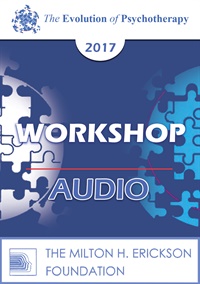
- Average Rating:
- Not yet rated
- Topic Areas:
- Workshops | Psychoanalysis | Personality Disorders | Psychotherapy | Narcissism
- Bundle:
- EP17 Audio Streaming Build a Bundle | Learning Track - EP17 Psychoanalysis Download
- Categories:
- Evolution of Psychotherapy | Evolution of Psychotherapy 2017 | Evolution of Psychotherapy Psychoanalysis Learning Track
- Faculty:
- Otto Kernberg, MD
- Duration:
- 2:43:55
- Format:
- Audio Only
- Original Program Date:
- Dec 16, 2017
- Short Description:
- This workshop will describe the various clinical syndromes reflecting narcissistic personality disorders, and the corresponding prognostic indicators for psychodynamic psychotherapy. The typical transference developments of these patients will be outlined, and corresponding technical interventions described. The relevance for the love life of these patients will be explored and treatment implications described.
- Price:
- $15.00 - Base Price
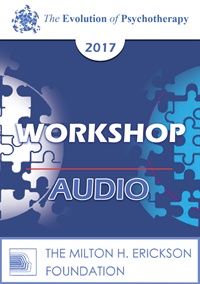
- Average Rating:
- Not yet rated
- Topic Areas:
- Workshops | Neuroscience | Neurobiology | Ericksonian Hypnosis and Therapy Techniques | Experiential Therapy
- Bundle:
- EP17 Audio Streaming Build a Bundle | Learning Track - EP17 Erickson Download
- Categories:
- Evolution of Psychotherapy | Evolution of Psychotherapy 2017 | Evolution of Psychotherapy Erickson Learning Track
- Faculty:
- Ernest Rossi, PhD | Kathryn Rossi, PhD
- Duration:
- 2:48:35
- Format:
- Audio Only
- Original Program Date:
- Dec 17, 2017
- Short Description:
- In this experiential workshop, we will learn the theory and practice of methods evolved out of Milton H Erickson’s innovative approaches to therapeutic hypnosis as presented in our new book. These easy-to-learn methods can facilitate Erickson’s natural problem solving and MindBody Healing that can supplement CBT, mindfulness, meditation, movement, and yoga.
- Price:
- $15.00 - Base Price

Credit available - Click Here for more information
- Average Rating:
- Not yet rated
- Topic Areas:
- Workshops | Experiential Therapy | Metaphors | Psychotherapy | Therapist Development | Evocative Communication
- Bundle:
- EP17 Video Stream Build a Bundle | Learning Track - EP17 Erickson Stream
- Categories:
- Evolution of Psychotherapy | Evolution of Psychotherapy 2017 | Evolution of Psychotherapy Erickson Learning Track | Online Continuing Education
- Faculty:
- Jeffrey Zeig, PhD
- Course Levels:
- Master Degree or Higher in Health-Related Field
- Duration:
- 2:20:46
- Format:
- Audio and Video
- Original Program Date:
- Dec 17, 2017
- Short Description:
- Patients change by virtue of the experiences that they live. Therapists can use advanced techniques including verbal and physical metaphors. Lecture, demonstration and practice.
- Price:
-
Sale is $29.00
price reduced from Base Price - $59.00
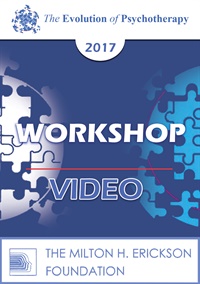
Credit available - Click Here for more information
- Average Rating:
- Not yet rated
- Topic Areas:
- Workshops | Psychoanalysis | Transference / Countertransference | Transference Focused Psychotherapy (TFP) | Psychotherapy
- Bundle:
- EP17 Video Stream Build a Bundle | Learning Track - EP17 Psychoanalysis Stream
- Categories:
- Evolution of Psychotherapy | Evolution of Psychotherapy 2017 | Evolution of Psychotherapy Psychoanalysis Learning Track | Online Continuing Education
- Faculty:
- Otto Kernberg, MD
- Course Levels:
- Master Degree or Higher in Health-Related Field
- Duration:
- 2:45:02
- Format:
- Audio and Video
- Original Program Date:
- Dec 17, 2017
- Short Description:
- This workshop will present an overview of the theory of TFP, its relation to the structure of severe personality disorders, and its technique. the technique of TFP will be outlined as general strategy, particular technical instruments, and tactical approaches to complications and particular situations. Major consideration include transference, countertransference, technical neutrality and interpretation.
- Price:
-
Sale is $29.00
price reduced from Base Price - $59.00
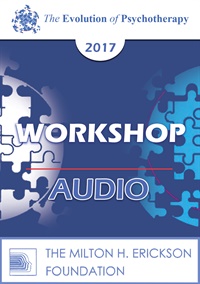
- Average Rating:
- Not yet rated
- Topic Areas:
- Workshops | Gestalt | Therapist Development
- Bundle:
- EP17 Audio Streaming Build a Bundle | Learning Track - EP17 Gestalt Download
- Categories:
- Evolution of Psychotherapy | Evolution of Psychotherapy 2017 | Evolution of Psychotherapy Gestalt Learning Track
- Faculty:
- Erving Polster, PhD
- Course Levels:
- Master Degree or Higher in Health-Related Field
- Duration:
- 1:35:17
- Format:
- Audio Only
- Original Program Date:
- Dec 17, 2017
- Short Description:
- Concentration, curiosity, fascination and simplicity of observation are natural agents of personhood. Dr. Polster will show how these are interwoven with four cornerstones of methodology. These are: the tightening of therapeutic sequences, establishing good quality contact, eliciting relevant stories, and identifying parts of the self. Live therapeutic sessions will illustrate the principles.
- Price:
- $15.00 - Base Price
Please wait ...

